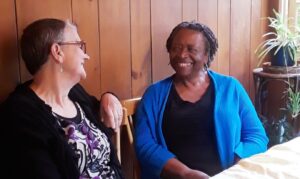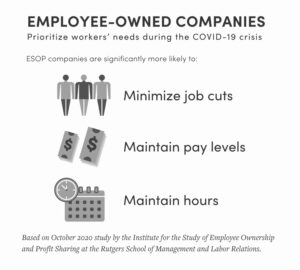Window Seat Media is a community storytelling organization in the South Sound that uses oral history and personal narrative to spark conversation, connection, and social change. When it launched its Third Thirty Oral History Project to honor and amplify elder voices, Window Seat trained community members in oral history interviewing and editing techniques and encouraged them to invite people they admired to participate in an interview. The stories gathered through this project offer a small glimpse into the lives of our community’s elders. Although certainly not the whole story or only story of each narrator, the oral histories still offer us an opportunity to ask: “Is there anything we haven’t heard that would be helpful to us now?”
In 2019, two stories came together to birth a third. The narrative thread that emerged sparked new community conversation about racism and stimulated creative partnerships to explore new ways to respond to enduring problems.

Lonnie Locke and John Worcester, unknown to each other at the time, were interviewed for the Third Thirty. John was interviewed by his wife Martha; Lonnie by her friend Debe Edden. Lonnie, a woman of African descent, is an Alabama native born in 1946; John, a man of European heritage, was a civil rights worker and native of the West. Lonnie and John met for the first time through the project. After hearing John’s story of his experiences as a civil rights worker in Alabama during the 60s, Lonnie was reminded of a collection of memoirs she had received earlier.
The memoirs had been gifted to Lonnie by her friend, Peggy Evans. Peggy had heard Lonnie presenting her story of growing up in Alabama from 1946 to 1964 at a gathering sponsored by a member of the Olympia Baha’i Community. Peggy approached Lonnie after the gathering, handing her a tattered brown envelope containing handwritten accounts from her husband and two other people, which she’d found after his death. Dave Evans, a white Oregon school teacher, had traveled to Selma, Alabama in March 1965, meeting up with an unidentified white man from California. Both had answered the call to assist in the march for voting rights from Selma to Montgomery. The men lived with African American families during their work and all three wrote of their experiences during that event. The three were not aware that John Worcester was also in Alabama at the same time, moving ahead of the marchers to set up tents and deliver food.
After returning to Oregon, Dave became keeper of the memoirs, which sat aging in his possessions for over 55 years. When Peggy gave them to Lonnie, she was unaware of the profound memories they would reawaken 56 years after Lonnie left Alabama to escape the racism she experienced there.
While pondering the gift, Lonnie happened to attend a public reading and conversation hosted by Window Seat Media’s Third Thirty Community Oral History Project, where John’s story was being presented. To Lonnie’s surprise, John had been in Selma at the same time as Dave Evans, although they never met.
John and Lonnie exchanged contact information with the intent of talking more about his story and those of the Selma three. After the Third Thirty event, Amber Huffstickler and Lonnie met and selected a name and purpose for the memoirs. The project became Looking Back, Moving Forward, dedicated to bringing local residents together to dialogue about racism, its impact on our community, and working in partnership for solutions.
In January 2020 the project was awarded a grant by Community Foundation of South Puget Sound and sponsorship by Community Café Collaboratives.
A team of community partners guided the project. Heartsparkle Players presented excerpts from the memoirs to create playback theatre and community dialogue; Window Seat Media recorded actors reading excerpts from the memoirs (who received voice coaching from Debe Edden of the Heartsparkle Players) and edited the memoirs into a short audio story; music for the story was performed and recorded by Stephen Weems of the New Life Baptist Church; Sharing Teens and Elders Project provided training on facilitating group dialogue; Equity Division of North Thurston School District promoted the project in the district; Spiritual Assembly of the Baha’is of Thurston County- members provided zoom technological help for events; and the South Sound Chapter of the Asian Pacific Islanders Coalition created online events bringing in noted persons involved in social justice for story sharing and skill building.
Through its community storytelling mission, Window Seat Media helped spark connections and bring together people who may have never met, much less collaborated and become friends. John’s photos and narrative from the voter registration drive in Alabama in the 1960s have become part of the website created by the Looking Back, Moving Forward Project. Another chapter to this story is being written by others still engaged in the struggle.
Listen to the Looking Back, Moving Forward memoirs
Learn about Window Seat’s Third Thirty Oral History Project

Be First to Comment